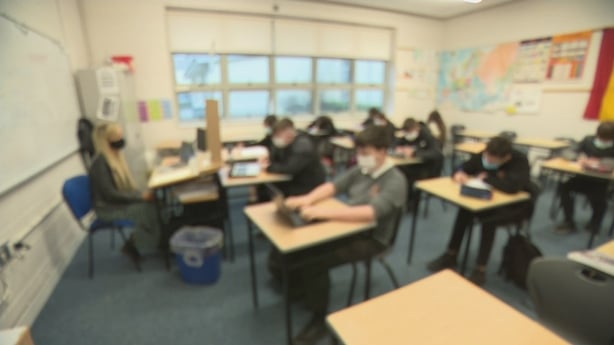"I'm very, very happy for them. It takes the pressure off. It is a huge reassurance for students."
This was the response of Kate Barry, teacher of Leaving Certificate English and French to this week's Leaving Certificate announcement.
Students may be disappointed that they did not get what many of them wanted - accredited grades, but their teachers believe that what they did get is "as good as", and Kate goes one step further: "This is better than what accredited grades would have been."
On Tuesday, the Government ruled out a hybrid Leaving Certificate, but they gave the class of '22 an important commitment; that their results will be no lower than last year's, and they said this year's papers would contain the same "radical" level of modifications as last year's did.
Teachers know their students, and those with long years of experience with Leaving Certificate assessment are well placed to predict how these measures will impact the class of '22.
This weekend, they are looking forward to seeing details of the plan announced on Tuesday.
They say what has been promised will be enormously helpful to their students.
But they want the reassurance of seeing for themselves - in black and white - the precise adjustments that are being made to papers in the individual subjects that they teach.

The Irish teacher
"The modifications promised in Irish will take an awful lot of pressure off the students", said Vivienne Weir, teacher of Irish at East Glendalough School in Wicklow.
"One of the biggest challenges of the Leaving Certificate examinations is time, but the changes to the Irish papers make them totally manageable."
Vivienne reckons that around one in five of this year's Leaving Certificate students has missed a significant number of school days due to Covid "especially after Christmas" - whether it was as a result of contracting the virus themselves or having to isolate as a close contact.
Out of her Leaving Certificate Irish class of 11, she says "three or four" are in this position.
"It is very difficult to teach Higher Level Irish remotely, and you couldn't teach live remote classes to students who were at home for long stretches because you were teaching a class in school.
"With Covid it is still hard, but students should be confident now that there is time for them to deliver a really good Leaving Cert."
But Vivienne is worried about the long-term effects of grade inflation, and the potential for what's been described as a 'cliff-edge' of deflation at some stage in the future.
"I know it was the only thing to do for this year's students, but what is going to happen to my fifth years? I have ambitious, brilliant fifth years. Are they going to suffer?"

Leaving Cert 2022: What are the updated plans?
The DEIS school teacher
"My students will be totally relieved of stress" said Edel Farrell, teacher of English at Coláiste Éamann Rís in Cork city.
The modifications in the English papers are extensive.
In paper 1, they have just one comprehension to answer instead of two.
In paper II, instead of having to answer questions in all three sections of that paper, they can disregard one section entirely.
It means for instance that - should they wish - a student need answer no question on poetry.
"They can now prepare for the topics they are confident in, the ones they know they are good at."
The Government said a central reason why accredited grades were rejected this year was the fact that one in four students had not sat any Junior Certificate exams.
Junior Certificate results were used last year and the year before to standardise marks arrived at by teachers and produce final accredited grades for students.
A number of students at this DEIS school are in that position, having skipped Transition Year.
"Their one fear was if accredited grades came in, how would their school be profiled? Their worry was 'I never did a Junior Cert so how are they going to get a grade for me?'. That was a big problem for them", said Edel.
The French teacher

Kate Barry's assertion that what has been offered this year is better than getting accredited grades is based on the fact that students have been promised both a wider choice in their examination papers, and that results will be no lower than last year's.
A teacher of French and English at Loreto Secondary School in Cork city, Kate said: "Before, in French the choice was quite narrow, and you really had to have all your topics covered.
"But now that broader choice means that they don't have to worry if there are some things that they have not managed to revise."
She said that while some of her students did want accredited grades and were disappointed that they were ruled out, most are also "delighted" with what has been announced.
Kate's students were worried about last year's grade inflation and the prospect of students from last year, with their bumper results, 'leapfrogging' them to secure coveted third level places.
So they are especially pleased with the guarantee that this year's results will be no lower than last year.
But Kate is concerned about the longer term impact of this decision: "I think we just have to take it year by year, and do the best for each cohort that we have."

The Physics teacher
Kevin Dunphy has been teaching Physics at Haywood Community School in Laois and preparing students there for Leaving Certificate exams in the subject for 30 years.
He reckons all of his students were keen on a hybrid model again this year.
But he is confident that what has been offered addresses their concerns.
"The extra choice will relieve all their worries and stress", he said, "and ours as well, because don't forget we teachers are concerned for their welfare. It has been an awful year for them."
"If it's the same as last year, we would have found that paper to be very student-centred and fair".
Kevin and other teachers wish they could have had concrete information on the precise format of the exam papers in time for the mock exams, which begin in most schools on Monday.
Reform
Dublin teacher Seamus Keane, who teaches History and Politics as well as English, also welcomed Tuesday's announcement.
"I think students should be happy that they are not going to be disadvantaged by suddenly having the bell curve drop off a cliff edge."
But Seamus says many in the class of '22 will still face huge pressure regarding getting to college.
He is frustrated by what he sees as the warping of second level education to solve a problem for third level.
"I would like to see open access to university. We're being used as a gateway. There should be a revolution at third level like there was second level in the 60's, [when second level education was opened up to all]."
Kate Barry agrees that the fundamental cause of most stress for students lies at the point of entry for third level: "Reforming the CAO and college entry is what is needed, not second level.
"I'm all for competitive entry but it is not fair for example, that if you want to do a modern languages course at third level, that your Maths result counts.
"The points system as it currently operates is a problem and I'd love to see it reformed."
On Thursday, Edel Farrell and her 5th years were looking again at poetry.
"I drive them mad with the poetry. They think I'm nuts", she joked. "But they love Mahon, because they can relate to him."
Sometimes it is important to take a step back and remember what senior cycle education should be about.
If all goes to plan, the class of '22 will move on this year, leave their school years behind and go on to college, or to training or the workforce.
Their labour will not have been in vain. But for their younger sisters and brothers the system will revert, and the long-term issues that their plight again highlighted will remain.







